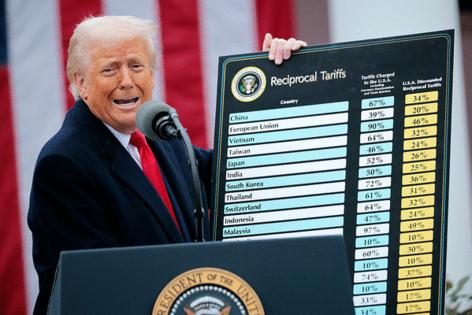Trump’s economic chaos is the anti-globalist revolution that young, working-class voters ordered
PARIS — Figuring out the future impact of U.S. President Donald Trump’s new global tariffs has turned into the economic equivalent of trying to decode modern art: confusing, polarizing and mostly just a bunch of projections. Economists are squinting at charts like they’re Jackson Pollock paintings while totally missing the point. Maybe they should try asking the same people who’d just look at it and say, “Yep, that’s a masterpiece … or maybe just something my kid made in daycare.” Those folks seem to have a better grasp of what’s going on right now.
Just like “climate change,” any supposed consensus around Trump's tariffs is really just a political Rorschach test. His critics immediately acted like it was an economic apocalypse, while others cheered, saying that it’s about time the U.S. pushed back against other countries’ protective subsidies and tariffs.
But here’s what’s getting lost. The people who voted for Trump aren’t wringing their hands over stock market volatility or trade flows. They’re busy making popcorn. Because this is exactly what they signed up for.
According to Navigator Research’s post-election survey from December 2024, Americans aged 18 to 44 had the lowest approval of President Biden’s economic policies — and they swung hardest toward Trump from the previous election. A separate report by Washington-based PRRI confirmed the trend that seniors were far less likely to back Trump.
Add to this age split the fact that Trump’s comeback was attributed to working-class support, as Reuters headlined, and the reality that nearly three-quarters of the lowest wage workers are between 16 and 34 years old, according to a Statista Research study.
These are more than just data points. They’re the fault lines for a societal quake.
What we’re witnessing is a generational class war. The youth have nothing left to lose — and they know it. Boomers, by contrast, are sitting atop a globalist treasure hoard that they amassed and now guard. They created the system, benefited from it and are now panicking as Trump hits the reset button.
Do you think the average young Trump voter is clutching their pearls over a stock market drop? Please. They don’t even have pearls. Or stocks. Let alone retirement funds. So when tariffs make market charts look like the kind of steep ride at a water park that gives mom and dad an atomic swimsuit wedgie as it bottoms out, they’re hardly grieving.
And when Trump’s critics warn about more expensive iPhones and gaming consoles, why wouldn’t young people just shrug? In Europe, we’ve already been through economic purgatory imposed by our leaders for far less of a return on our sacrifices. Sky-high energy costs for “as long as it takes” Ukraine solidarity and to stick it to Russia? Check. Bureaucrats urging us to huddle together like penguins for warmth while they police our thermostats?
Been there, done that. And where did it get us? Just more of the same. Surely Americans can survive a few pricey imports if it means potentially having a chance to slam the brakes on a system that’s turned them into debt-ridden serfs.
The real panic is about power, not prices. When the globalist establishment whines that tariffs will force layoffs, it sounds an awful lot like a threat. And if they follow through, they might end up fueling the kind of rebellion that elites have historically feared. Angry, unemployed young people aren’t known for their docility. If history is any guide, Wall Street might want to re-read the part where pitchforks show up.
Trump has just staged the opening act of something bigger. The globalist empire won’t go quietly, and there are already signs of scrambling.
Take Mark Carney, for instance. The banker turned party-appointed prime minister when Justin Trudeau resigned is now trying to make it official with Canadian voters later this month. Former head of the Bank of Canada, then Bank of England, and once chair of the Swiss-based Financial Stability Board responsible for governing the global financial system and ensuring its interdependence, Carney is basically globalization’s favorite child. In response to Trump’s tariffs, he boldly declared that if America won’t lead the world, then Canada will. That is, he will. His Conservative Party opponent in the upcoming election, Pierre Poilievre, apparently didn’t get the same memo, or share the same interest in being the world’s Karen, wanting to speak to every other country’s manager.
No one outside Canada is asking Carney to lead anything, except maybe a self-help group for the politically tone-deaf. But old habits apparently die hard after a career consisting of backslapping in the halls of global governance.
Meanwhile, the World Economic Forum is going through its own little PR crisis. Klaus Schwab, the Bond villain-adjacent founder, just stepped down and said the WEF needs to “recover its sense of mission.”
Translation: the “we penetrate the cabinets” line didn’t age well. Turns out the public doesn’t love the idea of unelected and moralizing billionaires “reshaping the future” for the entire world while flying private jets to climate summits.
Trump’s economic earthquake isn’t actually about spreadsheets, but about symbolism. Tariffs are just the opening salvo. What’s really happening is a generational reckoning. Trump is finally tackling the same system that anti-globalization activists going back at least 30 years failed to even dent. And the old guard? They’re starting to sweat.
This isn’t the end of the globalist world order, just the beginning of the end. Maybe. At least under Trump, there’s finally at least a glimmer of hope of seeing this failed experiment wrapped up in a series finale before he leaves office.

































Comments